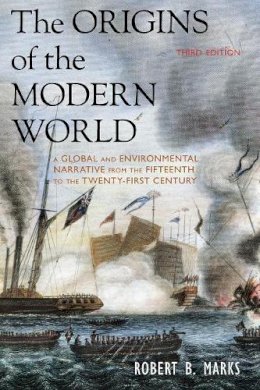
Stock image for illustration purposes only - book cover, edition or condition may vary.
The Origins of the Modern World. A Global and Environmental Narrative from the Fifteenth to the Twenty-First Century.
Robert B. Marks
€ 33.29
FREE Delivery in Ireland
Description for The Origins of the Modern World. A Global and Environmental Narrative from the Fifteenth to the Twenty-First Century.
Paperback. Now in a new edition, this clearly written and engrossing book presents a global and environmental narrative of the origins of the modern world since 1400. Robert Marks constructs a story in which Asia, Africa, and the New World play major roles and points to the resurgence of Asia and the vastly changed relationship of humans to the environment. Series: World Social Change. Num Pages: 280 pages, 1 black & white illustrations, 6 maps, 5 graphs. BIC Classification: 3J; HBG. Category: (U) Tertiary Education (US: College). Dimension: 227 x 151 x 16. Weight in Grams: 358.
This clearly written and engrossing book presents a global narrative of the origins of the modern world from 1400 to the present. Unlike most studies, which assume that the “rise of the West” is the story of the coming of the modern world, this history, drawing upon new scholarship on Asia, Africa, and the New World and upon the maturing...
Read moreProduct Details
Number of pages
280
Publisher
Rowman & Littlefield United States
Format
Paperback
Publication date
2015
Series
World Social Change
Condition
New
Weight
411g
Number of Pages
280
Place of Publication
Lanham, MD, United States
ISBN
9781442212404
SKU
V9781442212404
Shipping Time
Usually ships in 15 to 20 working days
Ref
99-2
About Robert B. Marks
Robert B. Marks is professor of history and environmental studies at Whittier College. His books include China: Its Environment and History (R&L). He is the recipient of Whittier College’s Harry W. Nerhood Teaching Excellence Award.
Reviews for The Origins of the Modern World. A Global and Environmental Narrative from the Fifteenth to the Twenty-First Century.
Marks offers a new broad sweep of this period that significantly is not Eurocentric in approach. His book reflects the more recent advanced scholarship that considers the influence of Asia and departs from the traditional interpretation of the ‘Rise of the West’ or the ‘European Miracle’ as the foundation of the modern world. This book is extremely informative; the author...
Read more